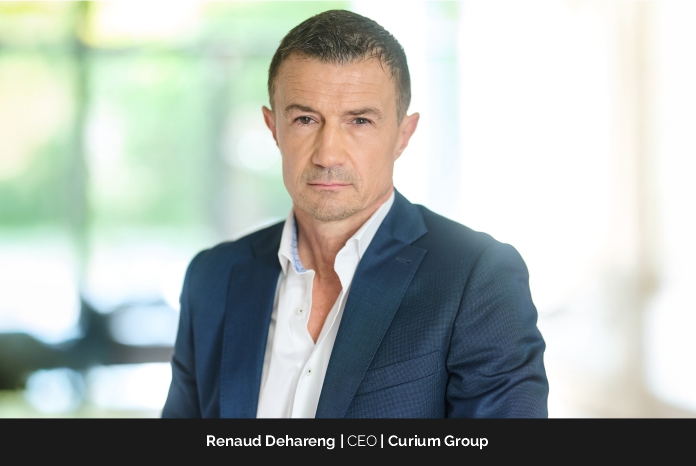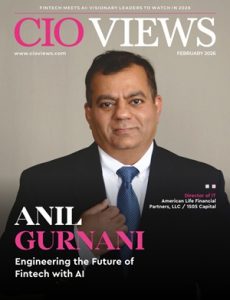Renaud Dehareng has spent more than two decades shaping the future of nuclear medicine. As CEO of Curium Group, he has built a company with a clear mission: to transform patient care by advancing both diagnosis and therapy in oncology. In this exclusive interview with CIO Views, he reflects on his journey, his leadership philosophy, and the bold choices that have defined his career.
Laying the Foundations of Curium
Renaud’s inspiration to transform healthcare came from a desire and ambition to make a truly meaningful impact on the world. “We are only scratching the surface now, but we have the potential to make a difference to millions of patients with cancer,” he notes.
Renaud first saw the potential in nuclear medicine when he consulted for IBA in Belgium on their strategy. The CEO asked him to join the management team to lead the molecular imaging side of the company. He realized early on that there was huge potential, but it was clear at that stage that it was sub-scale.
“We needed to raise capital to have the funds to acquire and unite the best nuclear medicine companies in the world so that we could then have scale and profitability,” he recalls. This became the foundation for what would become Curium. It took a while before it became meaningful, and took patience, but once it was profitable, they could invest in research to deliver on their promise to transform cancer treatment.
Building a Global Powerhouse in Nuclear Medicine
Renaud shares that Curium was born from carving out the nuclear medicine arm of IBA Molecular and merging it with the nuclear medicine arm of Mallinckrodt. “We wanted the IBA and Mallinckridt teams to look forward and not backwards so we created a completely. We created a completely new group company with a new name, clear values, and a future-focused approach towards innovation for our patients. That forward-looking spirit still defines Curium today,” he says.
Curium is uniquely qualified to meet the significant supply and distribution rigors that underlie success in the radiopharmaceuticals market, with a global footprint that extends to more than 70 countries on 6 continents, a skilled and dedicated team of nearly 5000 employees, and 4 manufacturing hubs in the US, France and Turkey.
Curium’s global leadership is embodied in a diverse and extensive portfolio of over 45 products, including 15 marketed products in the United States, that advance patient care for a wide range of diseases.
Renaud considers his proudest achievement at Curium to be realizing his vision of making the group a world leader in diagnostic nuclear medicine, and then boldly expanding its scope to include life-changing therapies. “We now have a portfolio of assets in clinical trials and are relentlessly pursuing our goal to transform cancer treatment. We invested everything, literally all of our cash flow for years, into that vision, and that took guts! It required courage, conviction, and the collective effort of hundreds of people. Seeing that bold move take shape has been the proudest moment of my leadership journey to date,” he declares.
Leadership Built on Trust, Commitment, Integrity, & Collaboration
Renaud’s role at Curium revolves around three pillars: setting the vision, shaping the strategy, and ensuring the right team is in place to deliver. He ensures that everyone at Curium is clear on the vital role they play in making an impact for their patients. His leadership style hinges on values and how he defines and prioritizes them to be the core of the group.
Curium has three core values: commitment, integrity, and collaboration. Renaud notes that commitment is now the DNA of the company – that is, doing what they say and delivering on their promises for their patients. Integrity means honesty and transparency – no politics, just being true with each other, with their patients, and with their customers and suppliers.
As one of their core values, collaboration is fundamental and vital because nuclear medicine requires diverse disciplines working seamlessly together. Renaud has built a leadership team that meets in person monthly all around the world, and he has focused on developing three other leaders into CEO roles to lead in North America, internationally, and for the new Biopharma company that makes up Curium Group.
“Today, success isn’t about me being the sole CEO – it’s about empowering them to be successful in their CEO roles and to carry the vision forward. As a leader, I focus on defining the vision and north star, aligning the strategy, and then trusting my team to execute on it. We have long-term objectives that are extremely clear. Micromanagement doesn’t build growth; trust does,” he insists.
Shaping the Future of Nuclear Medicine
For Renaud, diagnosing and treating cancer for Curium’s patients is the single most important driver in delivering its purpose, and he aims to tackle this goal one cancer at a time. Understanding what is the next problem they want to solve keeps him focused. “We have two assets in late-stage clinical trials for prostate cancer, and the next in the pipeline will target kidney cancer. With that defined, we then align resources, technologies, and talent around it. The patient need drives this prioritization, ensuring innovation is purposeful and impactful,” he explains.
A defining moment that shaped Renaud’s approach to leading the healthcare sector was persuading Curium’s board to invest $150 million into a therapy program that would take between 5 to 7 years to come to market. “It is always hard to get investors to invest in science, but we had a sound business case and credibility. It was a bold strategic shift from diagnostic into therapeutic radiopharmaceuticals and marked a pivotal point for Curium. The next milestone will be when we put our first radioligand therapy (RLT) on the market,” he shares.
To stay informed and inspired in a fast-evolving healthcare landscape, Renaud has a dedicated strategy team that monitors every development in nuclear medicine worldwide and talks to all the nuclear medicine players. “We know everything that’s going on in the nuclear medicine industry, and this, I believe, gives us one of many advantages. The inspiration comes from our purpose to redefine the experience of cancer through our trusted legacy in nuclear medicine. We have the potential to treat up to 80% of cancers for millions of patients globally in the next 10-15 years, and I don’t think you can find a more motivating mission than that,” he remarks.
Renaud is confident that Curium will continue to be a leader in nuclear medicine diagnostics and treatments with RLT,“We are going to lead it! By treating cancer, one by one, and finding the right assets to make that possible,” he proclaims.
From Product to Patient: Building a Fully Integrated Model
With the nuclear medicine industry constantly shifting and evolving, Curium has seen both the consolidation of smaller players and the entrance of major pharma players back to the market. Some big pharma companies were previously involved in nuclear medicine and disappeared as they struggled to build the necessary infrastructure to scale up. Now they see the opportunity to make a meaningful difference, some are reconsidering. We are a pure player in nuclear medicine with decades of history in the industry and one of our competitive advantages is that we offer 100% of the value chain.
“I don’t see strategy as an annual process; we are reshaping it all the time and have a very agile approach. Competitors are constantly popping up, and we need to react, be nimble, and be ahead of them. We want to be the best, and to do that, we need to have a deep understanding of our competitors,” he observes.
Renaud notes that success in nuclear medicine depends on the ability to integrate an extraordinarily wide range of capabilities – pre-clinical research, engineering, chemistry, quality assurance, regulatory affairs, production, logistics, clinical development, pricing, reimbursement, and commercial expertise. While each function is essential, the real challenge is bringing them together into a cohesive operating model. This integration can’t be built from scratch; it takes time, acquisitions, and careful alignment to complete the puzzle.
As an example, he shares how protecting a product with intellectual property requires IP lawyers who understand chemistry working hand-in-hand with CMC radiochemists to define boundaries around a product. Neither group can achieve it alone – it’s only through deep integration of these key skills that it works.
The same is true across the business: whether it’s quality assurance, nuclear pharmacy, or production, every discipline must work seamlessly together. That operating model is complex to build, but it’s the key to making nuclear medicine companies succeed where others have previously failed. “It sets us apart from our competitors, as we offer 100% of the value chain, from product to patient,” Renaud quips.
Leadership is About Enabling Others to Rise
Renaud believes that balancing work and personal life comes down to building the right team and empowering them, trusting them to deliver on the strategy. He doesn’t believe in CEOs working 100-hour weeks, as it doesn’t move the needle, and he doesn’t have the expertise that his collective leadership team has.
“It’s taken me years to get the right people in place that I trust, and this allows me to pursue my passions, like sailing, guiding my three children through their navigation of life, with the same passion and intensity I bring to Curium,” he explains, “I am part of a sailing race team, and here too it has taken years of preparation to get the right team on the boat for us to take on big challenges. You can’t have ambitious goals if you don’t have the right team to trust. Leadership isn’t about doing everything yourself – it’s about enabling others to rise.”
To emerging healthcare leaders, Renaud offers the following words of wisdom: Build a strong vision and truly believe in it. Conviction is the fuel for change.
Conclusion
As CEO of Curium, Renaud Dehareng hopes to leave a legacy of having developed solutions for as many cancers as possible that will help millions of people globally, and show that it is possible to secure massive investment in science. “Personally, I hope to be remembered as an inspiring leader – someone who believed in bold visions, trusted his people to deliver on them, and helped shape a better future for patients. That would make me very proud,” he concludes.





